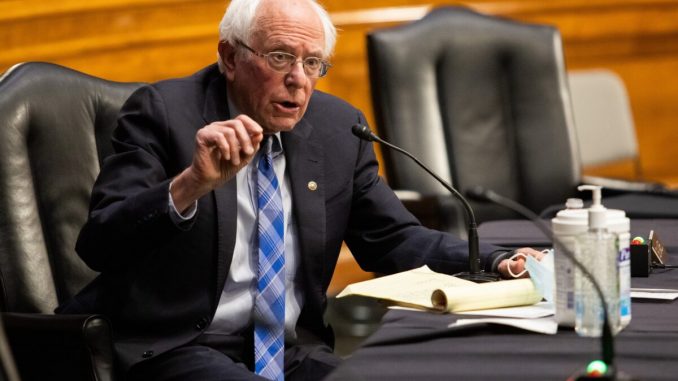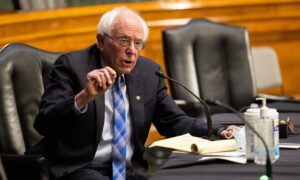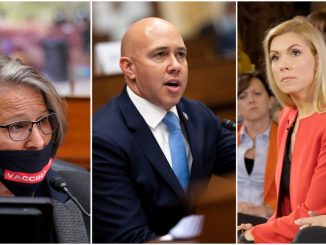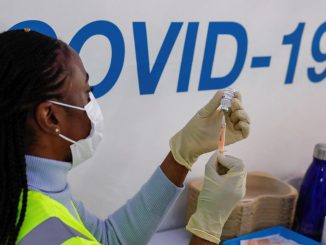

WASHINGTON—A group of progressive lawmakers are urging President Joe Biden to temporarily waive intellectual property and patent rights on COVID-19 vaccines to provide “equitable access” to vaccination around the world. Opponents, however, call such proposals “unnecessary” and “misguided.”
Several U.S. Senate and House members led by Bernie Sanders (I-Vt.), together with more than a dozen health and labor organizations, are expected to deliver 2 million petitions to Biden on April 23 in the latest effort to pressure the White House to lift patent barriers so that vaccines can be manufactured across different countries.
South Africa and India were the first countries that proposed the idea in October 2020. Both countries petitioned the World Trade Organization (WTO) to temporarily waive the rules of the organization’s Trade-Related Aspects of Intellectual Property (TRIPS) agreement.
The TRIPs agreement sets out the minimum standards of intellectual property (IP) protection to be provided by each member country. The agreement has been crucial to protect U.S. innovation, especially in the pharmaceutical and biotechnology industries. Because of the WTO’s protection rules, countries are barred from producing COVID-19 vaccines owned by multinational companies including U.S.-based Moderna, Pfizer, and Johnson & Johnson.
So far, more than 100 lower- and middle-income countries have supported the proposal by South Africa and India and called for a temporary WTO waiver.
The White House signaled last month that it would consider suspending IP protections for vaccines in response to pressures from developing countries and progressive lawmakers.
Last week, more than 170 former world leaders and Nobel laureates signed an open letter to Biden, stating “a WTO waiver is a vital and necessary step to bringing an end to this pandemic.”
Signatories of the letter included former UK Prime Minister Gordon Brown and former USSR President Mikhail Gorbachev.
“[Nine] in 10 people in most poor countries may well go without a vaccine this year,” the letter stated. “At this pace, many nations will be left waiting until at least 2024 to achieve mass COVID-19 immunization.”
Advocates claim that waiving the IP rules on vaccines will expedite global vaccination efforts to end the pandemic and facilitate a faster economic recovery.
A recent poll also found that 60 percent of American voters want the Biden administration to remove patent barriers to expedite vaccine rollout. The survey, conducted by Data for Progress and the Progressive International, showed that 72 percent of Democrats and 50 percent of Republicans support the action.
Sanders and nine progressive Senate Democrats including Sens. Elizabeth Warren (D-Mass.) and Tammy Baldwin (D-Wis.) sent a letter to Biden urging him to “prioritize people over pharmaceutical company profits.”
“From a global public health perspective, this waiver is vital to ensuring sufficient volume of and equitable access to COVID-19 vaccines and therapeutics around the world,” the letter stated.
So far, developed countries and pharmaceutical companies that own the COVID-19 vaccines have opposed the proposal. And some experts claim patents are less of an issue for a faster and more equitable vaccine rollout.
“The central challenge here is manufacturing vaccines and therapeutics at scale, not IP,” according to Stephen Ezell, vice president at the technology think tank Information Technology and Innovation Foundation.
“The COVID-19 TRIPS IP Waiver is wholly unnecessary and the Biden administration should join other countries/regions like the UK, Japan, EU, and Norway not endorse it,” Ezell wrote in an email to The Epoch Times.
He also noted that “there is no credible evidence of instances in which intellectual property has hindered the development or production” of vaccines or therapeutics.
Adam Poonawalla, CEO of the Serum Institute of India, the world’s largest generics facility, rejected the comments that patent restrictions have slowed vaccine rollout in many countries.
“No. There are enough manufacturers, it just takes time to scale up,” he told The Guardian in February.
“And by the way, I have been blown away by the cooperation between the public and private sectors in the last year, in developing these vaccines,” Poonawalla said, citing the lack of global regulatory harmonization as a far greater cause of delays in vaccine distribution.
“I have 70m doses that I can’t ship because they have been purchased but not approved. They have a shelf life of six months.”
The U.S. Chamber of Commerce called the proposals for a temporary WTO waiver “misguided” and a “distraction.”
In a statement in March, the Chamber, instead, called for “decisive and bold action to remove regulatory and trade barriers in order to boost the global distribution of treatments and vaccines.”





Be the first to comment